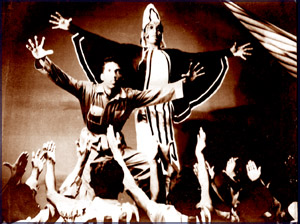A Critique on the State Sinhala Drama Festival of 1966
'An actor is one who is made and not one who is born' should be the
motto of Sinhala theatre
Subject matter of realistic conversational original Plays in 1960's
Prof. Ariya Rajakaruna
Translated by Ranga Chandrarathne
(This is a translation of a critique by Prof. Ariya Rajakaruna. He
served as the Head of the Department of Sinhala of the University of
Peradeniya. He is currently a visiting lecturer attached to the
Department of Fine Arts and Sinhala. This is the only comprehensive
review written on any State Sinhala Drama Festival held during the last
five decades. This review was first published in 1967.This critique has
been translated for the first time)
Continued from October 31
|

Aandi Tikai Ambalamai
Picture by Chandrasena Dassanayake
|
S. Karunaratne's "Erabadu Mal Pottu Pipila" is based on a folk tale.
Pancha (Nimal Dayaratne) is a village boy. He lives with his mother (Malani
Fonseka) and grandma (Chandra Kaluarachchi).
He enjoys nature. He is subjected to bullying at the hands of other
children because he is a fatherless child. Mudalali became furious as
Pancha hits children who bully him. The family could no longer live in
the village because of the innocent child.
At this moment, Pancha seeks help from Manik Hami (Sathischandra
Edirisinghe) who lives on a nearby hillock. Manik Hami rescues the
family from Mudalali. Pancha requests Manik Hami to be his father. Manik
Hami joins Pancha's mother and thus protects an innocent family.
The drama is based on an extremely natural plot. However, it is not
clear what the dramatis expects from using a child as a lead role? If
his intention was to portray a mental status of a lonely child, who is
fatherless and enjoys nature, it has not been fruitful.
The ending of the drama has been an obstacle to reach that goal. The
heated arguments between the child and Mudalali, Mudalali and Manik Hami
and Manik Hami's union with child's mother have not been meaningfully
integrated into the drama in a manner suited for a children's play.
Nimal Dayaratne's acting as a child actor is commendable. Malani
Fonseka as Sudumanika portrayed complex character in the village with a
certain degree of talent. There are few instances which showed that S.
Karunaratna has considerable knowledge of drama.
Not enacting the argument between Mudalali and Manik Hami, some
characters speaking out of the stage can be considered as such
instances. Drama has not been profited from using group of singer.
Production has become weak owing to the weak script.
"Erabudu Mal" showed the need for a tradition of children's drama
with only child actors and actresses.
Another three dramas which have been presented for the festival, have
followed the same path. These dramas are Ameradasa Jayatunga's "Viduru
Diva", Piyasena Costa's "Ekman Kotai" and Chandrasena Dassanayaka's "Andi
Tikai Ambalamai".
In Amerdasa Jayatunga's "Viduru Diva", the story of Vijaya and Kuveni
has been presented with a novel outlook. Rendering a novel outlook to an
old story can be considered as an important work.
Ediriweera Saraschandra's Maname and Singhabahu did the same task. He
uses an old story to portray innermost feeling of human beings.
Jayatunga took a different approach.
He renders the story of Vijaya and Kuveni with an emphasis on
economic aspects. Dramatists ask the audience to consider Kuveni as the
person who introduced textile industry, for the first time, to the
world. The story has been woven in a manner highlighting this.
The actors and actresses behaviour on the stage is estrange. The cast
talk and gesticulate in a stylist manner. Especially gesticulation on
the part of actresses should be looked into.
This reminds of the actresses in Peking Opera. In Peking Opera,
actresses perform acrobats and different gesticulations of fighting on
the stage. Their gesticulations are always being done as an added
feature.
The main reason for this is that it is the tradition of the actresses
of the Peking Opera to behave in a manner not harming the aesthetic
quality and the female features. Kuveni's (Malika Jayatunga) performance
with stretching hands and foot is ugly.
It has not been pleasant scene. Producer failed to deploy talented
cast for a weak drama "Viduru Diva". "Viduru Diva" is an important
example to show that stylist drama can be used not only to generate
humour but also other zests.
Piyasena' Costa's "Ekman Kotai" is based on a folk tale. Dramatist's
intention was to create humour. A plot for a drama should be appropriate
to create zest.
In this drama, plot has not been properly dramatised. When drama is
of no zest, it fails to attract the audience even if it creates a taste
of music. If the cast is talented than those in the drama, they could
have presented it in a more attractive manner.
Chandrasena Dasanayake's "Aandi Tikai Ambalamai" is a drama that
ridicules the United Nations. He compares the UN with an Aandi-gathered
Ambalama. Different countries were given names (according to dramatist)
to highlight their inherent characteristics.
Satirical names such as Danavadi American Appu, Prajathanthrige
Brithania, Adamana Anduge Pansia, Maksvadi Rusia, Alihul Allannage
Chinis, Samajavadi Chinavardana, Katath Hum Kiyannange India Agaberana,
Topiya Herena Atata Nananage Arabivansa, Nikan Innange Ceylonis, Japanis
and Samadanage Burumaya, have been used for the drama.
Dasanayaka successfully produced the drama "Aandi Tikai Ambalamai" as
a satirical drama. However, his satire has only a transient value.
Further more, it seems as superficial satire.
Therefore, it cannot be considered as a great production, creating
great zest. "Aandi Tikai Ambalamai" shows that stylist drama can be used
as an effective medium to create humour.
|

